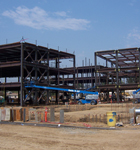At a Glance
Location
Eagle, ID
Founded
1998
Employees
35
Specialties
Affordable multifamily housing, senior housing, and mixed-use infill developments
Annual Sales
$120 million
Caleb Roope’s interest in charitable construction dates all the way back to his days as a student. “I spent my summer breaks in college building playgrounds for affordable-housing communities,” Roope says, “and I loved seeing the difference I helped make in people’s lives. It gave my work a purpose, and it was through those experiences that I decided what I wanted to do for a living.”
Following college, Roope began learning more about affordable housing while working for developers and contractors. He coupled his degree in accounting with his housing and real estate knowledge—and passion for making a difference—and founded the Pacific Companies (TPC) in 1998. “As I learned more [about affordable housing], I realized there were few options for hardworking families who needed a nice, safe, affordable place to live,” says Roope, currently president of the firm. “This need [of others], combined with my desire to produce an asset with community benefit, made me realize this field really suited my disposition.” Now, creating projects with a purpose, Roope and TPC design, build, and manage affordable housing for seniors and toiling families throughout the western United States.
Top 5 Challenges of Managing Properties in Multiple Areas
1. Working with experienced property managers and asset managers helps in expanding into new markets as needed.
2. Meeting the unique needs of different communities requires flexibility in all phases of development, design, and construction.
3. It’s helpful to have managing partners and property managers with a diversity of expertise in varying aspects of affordable housing, special-needs housing, particular financing structures, etc.
4. It’s critical to maintain an understanding of diverse markets in case there’s an opportunity to expand further.
5. Watching market forces and understanding demand helps determine what needs building and bidding on.
TPC consists of three arms: Pacific West Communities (PWC), a real estate and financing firm specializing in the development and ownership of affordable workforce housing; Pacific West Architecture (PWA), a group of professionals providing the architectural and engineering components of the real-estate-development process; and Pacific West Builders (PWB), a licensed and bonded general contractor and construction-management firm specializing in affordable housing. This unique mix of disciplines—all under one umbrella—is what sets TPC apart from its peers.
Over the past 13 years, the company has produced more than 92 properties, and Roope credits TPC’s success to a “great team of people,” many of whom have been with the company for more than a decade. Beyond its staff, though, the company’s unwavering dedication to doing things the “right way” surely has helped it maintain its stronghold in the market. “Our focus is to always develop the best possible execution for the property,” Roope says. “Even though we have the capability and skill to execute an entire project from start to finish, we are not going to demand we complete every aspect every time. Often, we will partner with local architects or contractors if it is a good fit and makes sense.”
This is one of TPC’s more unusual traits, the firm regularly coordinating projects with competitors and stepping in to perform a certain task—such as the design work—while the other firms take care of the rest. “Because we provide a full range of services, we can afford to give up several parts of a project and still have a profitable outcome,” Roope says. “I’ve found this approach actually produces a great number of opportunities.”
Roope’s favorite project is a 47-unit housing development in Santa Maria, California, that will be complete in fall 2011. TPC took over the failed condominium project and turned it into a special-needs development that will house at-risk individuals, including recovering substance abusers and single parents who were former victims of domestic abuse. “This situation was truly one where we took lemons and made lemonade,” Roope says. “We are going to be able to provide a beautiful home for people who have not had much beauty in their lives.”

Another notable project is Parkside at Sycamore, an apartment complex in West Sacramento, California, built on the land of a former car dealership. Located in a depressed neighborhood, the 62-unit development was part of an urban-infill and revitalization project.
Because of its strong history and bottom line, one thing TPC brings to the table that allows it to take on projects such as these is the ability to defer all profits for each project until completion. TPC management also understands market forces and changes plans as needed. In fact, Roope employs operational and strategic advisors who constantly monitor trends to prepare for future market threats and shifts. As a result, TPC has started looking at diversifying its opportunities to grab work on other developments such as student housing and charter schools. “We always want to be ready to come to the market with other products that complement our core strengths,” Roope says. “However, our main goal is that our projects always serve some type of public purpose because that is where we find the most satisfaction.” ABQ


